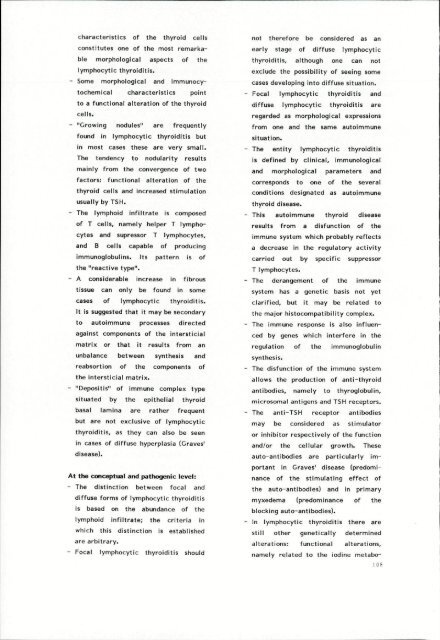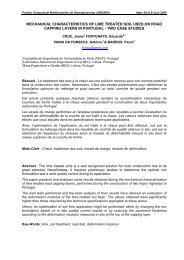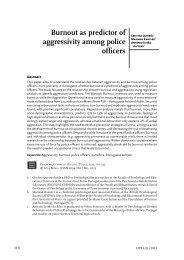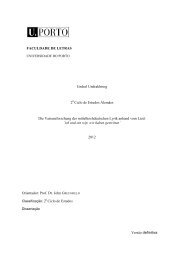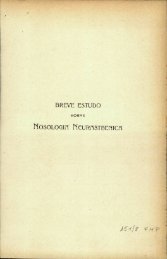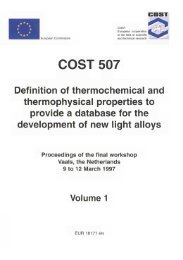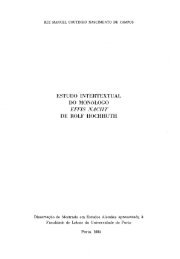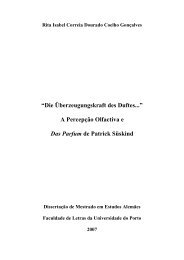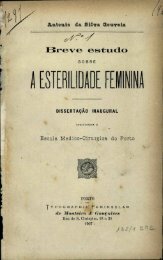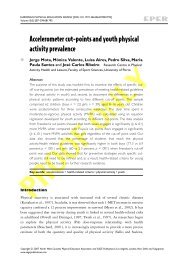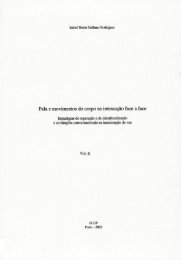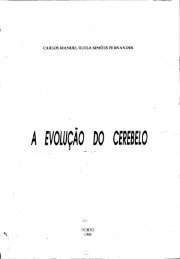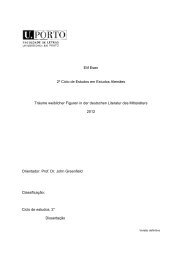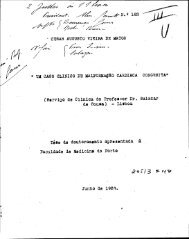Tireoidite linfocítica - Repositório Aberto da Universidade do Porto
Tireoidite linfocítica - Repositório Aberto da Universidade do Porto
Tireoidite linfocítica - Repositório Aberto da Universidade do Porto
You also want an ePaper? Increase the reach of your titles
YUMPU automatically turns print PDFs into web optimized ePapers that Google loves.
characteristics of the thyroid cells<br />
constitutes one of the most remarka<br />
ble morphological aspects of the<br />
lymphocytic thyroiditis.<br />
- Some morphological and immunocy-<br />
tochemical characteristics point<br />
to a functional alteration of the thyroid<br />
cells.<br />
- "Growing nodules" are frequently<br />
found in lymphocytic thyroiditis but<br />
in most cases these are very small.<br />
The tendency to nodularity results<br />
mainly from the convergence of two<br />
factors: functional alteration of the<br />
thyroid cells and increased stimulation<br />
usually by TSH.<br />
- The lymphoid infiltrate is composed<br />
of T cells, namely helper T lympho<br />
cytes and supressor T lymphocytes,<br />
and B cells capable of producing<br />
immunoglobulins. Its pattern is of<br />
the "reactive type".<br />
- A considerable increase in fibrous<br />
tissue can only be found in some<br />
cases of lymphocytic thyroiditis.<br />
It is suggested that it may be secon<strong>da</strong>ry<br />
to autoimmune processes directed<br />
against components of the intersticial<br />
matrix or that it results from an<br />
unbalance between synthesis and<br />
reabsortion of the components of<br />
the intersticial matrix.<br />
- "Depositis" of immune complex type<br />
situated by the epithelial thyroid<br />
basal lamina are rather frequent<br />
but are not exclusive of lymphocytic<br />
thyroiditis, as they can also be seen<br />
in cases of diffuse hyperplasia (Graves'<br />
disease).<br />
At the conceptual and pathogenic level:<br />
- The distinction between focal and<br />
diffuse forms of lymphocytic thyroiditis<br />
is based on the abun<strong>da</strong>nce of the<br />
lymphoid infiltrate; the criteria in<br />
which this distinction is established<br />
are arbitrary.<br />
- Focal lymphocytic thyroiditis should<br />
not therefore be considered as an<br />
early stage of diffuse lymphocytic<br />
thyroiditis, although one can not<br />
exclude the possibility of seeing some<br />
cases developing into diffuse situation.<br />
- Focal lymphocytic thyroiditis and<br />
diffuse lymphocytic thyroiditis are<br />
regarded as morphological expressions<br />
from one and the same autoimmune<br />
situation.<br />
- The entity lymphocytic thyroiditis<br />
is defined by clinical, immunological<br />
and morphological parameters and<br />
corresponds to one of the several<br />
conditions designated as autoimmune<br />
thyroid disease.<br />
- This autoimmune thyroid disease<br />
results from a disfunction of the<br />
immune system which probably reflects<br />
a decrease in the regulatory activity<br />
carried out by specific suppressor<br />
T lymphocytes.<br />
- The derangement of the immune<br />
system has a genetic basis not yet<br />
clarified, but it may be related to<br />
the major histocompatibility complex.<br />
- The immune response is also influen<br />
ced by genes which interfere in the<br />
regulation of the immunoglobulin<br />
synthesis.<br />
- The disfunction of the immune system<br />
allows the production of anti-thyroid<br />
antibodies, namely to thyroglobulin,<br />
microsomal antigens and TSH receptors.<br />
- The anti-TSH receptor antibodies<br />
may be considered as stimulator<br />
or inhibitor respectively of the function<br />
and/or the cellular growth. These<br />
auto-antibodies are particularly im<br />
portant in Graves' disease (pre<strong>do</strong>mi<br />
nance of the stimulating effect of<br />
the auto-antibodies) and in primary<br />
myxedema (pre<strong>do</strong>minance of the<br />
blocking auto-antibodies).<br />
- In lymphocytic thyroiditis there are<br />
still other genetically determined<br />
alterations: functional alterations,<br />
namely related to the iodine metabo-<br />
108


